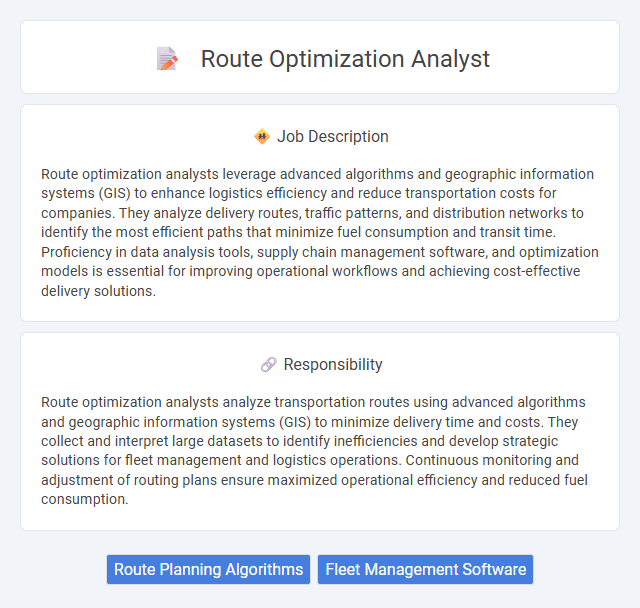
Route optimization analysts leverage advanced algorithms and geographic information systems (GIS) to enhance logistics efficiency and reduce transportation costs for companies. They analyze delivery routes, traffic patterns, and distribution networks to identify the most efficient paths that minimize fuel consumption and transit time. Proficiency in data analysis tools, supply chain management software, and optimization models is essential for improving operational workflows and achieving cost-effective delivery solutions.
Individuals with strong analytical skills and a keen interest in logistics are likely suitable for a Route Optimization Analyst role. Candidates who enjoy problem-solving, working with data, and optimizing processes may find this job fulfilling. Those who prefer dynamic environments and can adapt to changing conditions may also thrive in this position.
Qualification
A Route Optimization Analyst typically requires strong analytical skills, proficiency in geographic information systems (GIS), and experience with route planning software such as ArcGIS, Route4Me, or OptimoRoute. A background in logistics, operations research, computer science, or a related field, often supported by a bachelor's degree, enhances the ability to analyze and optimize delivery routes for efficiency and cost reduction. Expertise in data analysis tools like SQL, Python, or R for handling large datasets and generating actionable insights is highly valuable in this role.
Responsibility
Route optimization analysts analyze transportation routes using advanced algorithms and geographic information systems (GIS) to minimize delivery time and costs. They collect and interpret large datasets to identify inefficiencies and develop strategic solutions for fleet management and logistics operations. Continuous monitoring and adjustment of routing plans ensure maximized operational efficiency and reduced fuel consumption.
Benefit
Route optimization analysts likely enhance supply chain efficiency by identifying the most cost-effective and time-efficient delivery paths. Their work probably reduces fuel consumption and lowers overall transportation expenses, contributing to significant operational savings. Improved route planning may also increase customer satisfaction through faster and more reliable deliveries.
Challenge
The role of a Route Optimization Analyst likely involves complex problem-solving challenges related to logistics and transportation efficiency. They probably face difficulties in balancing cost reduction, time constraints, and resource allocation while adapting to dynamic variables such as traffic conditions and delivery schedules. Handling large datasets and implementing advanced algorithms might present continuous challenges requiring analytical skills and innovative thinking.
Career Advancement
Route optimization analysts leverage data analytics and machine learning to improve transportation efficiency, reducing costs and delivery times. Mastery in geographic information systems (GIS), coding in Python or R, and proficiency with optimization algorithms are critical skills that lead to roles such as Senior Analyst or Operations Manager. Career advancement often includes transitioning into strategic planning, supply chain management, or data science leadership positions with significant impact on business operations.
Key Terms
Route Planning Algorithms
A Route Optimization Analyst specializes in developing and implementing route planning algorithms to enhance logistics efficiency and reduce transportation costs. Proficiency in algorithms such as Dijkstra's, A*, and Vehicle Routing Problem (VRP) heuristics enables precise optimization of delivery routes based on factors like distance, traffic, and customer time windows. Leveraging advanced data analytics and Geographic Information Systems (GIS), these professionals drive improvements in supply chain operations and fleet management.
Fleet Management Software
A Route Optimization Analyst specializes in utilizing Fleet Management Software to improve transportation efficiency and reduce operational costs. They analyze GPS data, traffic patterns, and delivery schedules to design the most efficient routes, enhancing fleet productivity. Expertise in software platforms like Verizon Connect, Fleet Complete, or Samsara enables precise route planning, minimizing fuel consumption and maximizing on-time deliveries.
 kuljobs.com
kuljobs.com